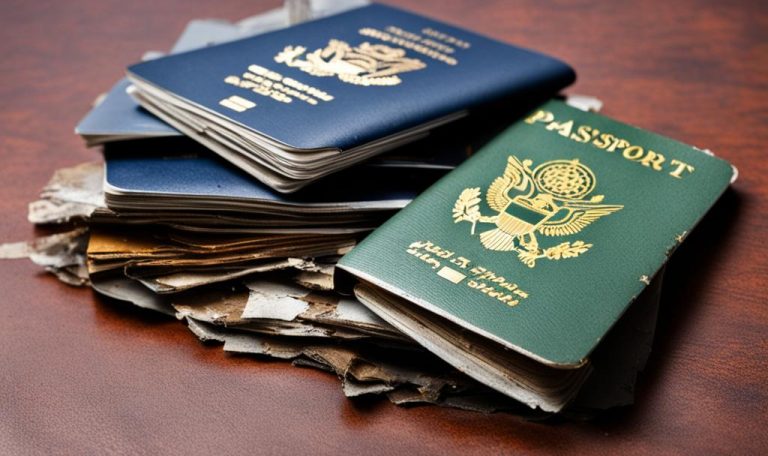European nations now with the most powerful passport: European nations have emerged as leaders in passport power, now holding the distinction of having the most powerful passport in the world. German, French, Italian, and Spanish passports have risen to the top spot, sharing this coveted position with Singapore. This achievement means that passport holders from these European nations and Singapore now enjoy visa-free access to a record-breaking 194 countries out of 227 worldwide, including Panama and Costa Rica.
Key Takeaways
- European nations, including France, Germany, Italy, and Spain, now have the most powerful passport in the world.
- These passports provide visa-free access to a record-breaking 194 countries out of 227 globally.
- Singapore shares the top spot with these European nations in terms of passport power.
- Passport rankings are determined by the Henley Passport Index, which considers the number of visa-free destinations.
- European countries dominate the top 10 rankings, showcasing the influence of their passports.
The Henley Passport Index Ranking
The Henley Passport Index is a comprehensive ranking system that evaluates passports based on the number of countries their holders can visit without a visa. This influential ranking draws data from the International Air Transport Association (IATA) and is regularly updated to reflect changing travel regulations and agreements.
Previously, Germany, Italy, Spain, and France held the top three spots. However, they now share the first place with Singapore, boasting unparalleled visa-free access to a staggering number of destinations. These European nations have cemented their positions as global leaders in passport power.
European countries dominate the top 10 rankings of the Henley Passport Index. Finland, Sweden, and South Korea join the leading pack, solidifying their positions as nations that provide their citizens with seamless international travel opportunities.
Let’s take a closer look at the top 10 rankings of the Henley Passport Index:
| Rank | Country | Visa-Free Access |
|---|---|---|
| 1 | Germany, Italy, Spain, France, Singapore | 194 |
European Nations in the Top 10
European countries have established a formidable presence in the top 10 rankings of the Henley Passport Index. Reflecting their powerful passports and global access, these countries consistently secure prominent positions in the list of the world’s most travel-friendly nations.
Securing the second spot, Finland, Sweden, and South Korea exemplify the strength of European passports. These countries provide their citizens with extensive visa-free access to various destinations, offering unparalleled travel freedom and convenience.
Continuing the trend, Austria, Denmark, Ireland, and the Netherlands claim the third spot in the rankings. These European nations, known for their rich cultural heritage and economic prowess, provide their passport holders with excellent global mobility opportunities.
The fourth place is held by a diverse group of countries that includes Belgium, Luxembourg, Norway, Portugal, and the United Kingdom. These nations boast powerful passports that enable their citizens to explore a vast array of international destinations with ease.
Switzerland, Greece, Malta, and other European nations round out the top five, further emphasizing the prominence of European passports and their impact on individuals’ travel experiences.
European Nations in the Top 20
Many other European countries also enjoy significant influence in the Henley Passport Index. Cyprus, Bulgaria, Croatia, Romania, Monaco, and Andorra are among the European nations that secure positions in the top 20 rankings, further highlighting the collective strength of European passports.
A Visual Representation of European Passport Power
| Rank | Country | Visa-free Access |
|---|---|---|
| 2 | Finland, Sweden, South Korea | 188 |
| 3 | Austria, Denmark, Ireland, Netherlands | 187 |
| 4 | Belgium, Luxembourg, Norway, Portugal, UK | 186 |
| 5 | Greece, Malta, Switzerland | 185 |
| 11 | Cyprus, Bulgaria, Croatia, Romania, Monaco, Andorra | 180+ |

The table and image above provide a visual representation of the powerful passports held by European nations. As Europe continues to foster closer economic and political integration, the influence and strength of European passports remain unrivaled in the realm of international travel.
Passports with the Least Power
When it comes to passport power, some countries unfortunately find themselves at the bottom of the list. These low-ranked countries have limited visa-free access, making their passports the weakest in the world.
Afghanistan, for instance, holds the title for the weakest passport, with visa-free access to only 28 out of 227 countries. This means that Afghan passport holders face significant challenges when it comes to international travel and accessing various destinations.
Joining Afghanistan at the bottom are countries such as Syria, Iraq, Pakistan, and Yemen, which also have limited passport power and face numerous visa restrictions.
It is important to note that the average number of visa-free destinations has significantly increased over the years. In 2006, the average number of visa-free destinations was 58. However, in 2024, this number has nearly doubled to 111, highlighting the growing importance of global mobility and travel freedom.
To visually illustrate the contrasting levels of passport power, let’s take a look at the comparison table below:
| Country | Number of Visa-Free Destinations |
|---|---|
| Afghanistan | 28 |
| Syria | 29 |
| Iraq | 33 |
| Pakistan | 37 |
| Yemen | 43 |
As the table demonstrates, these countries have a significantly limited number of visa-free destinations compared to the global average.

It is clear that while passport power has increased overall, there is still work to be done in ensuring equal access and opportunities for all travelers. The need for increased global mobility and visa-free access remains important to promote international cooperation and cultural exchange.
Changes in Passport Rankings Over the Years
Over the past decade, there have been significant shifts in the global passport rankings. Countries’ positions have changed, reflecting the evolving landscape of travel freedom. Let’s take a closer look at some noteworthy changes:
“The United Arab Emirates has climbed to 11th place, offering access to 183 destinations without a visa.”
The United Arab Emirates has witnessed a remarkable rise in passport rankings, now occupying the 11th position. Emirati passport holders enjoy visa-free access to an impressive 183 destinations worldwide. This upward shift signifies the increasing global recognition of the UAE as a travel-friendly nation.
“China has also seen an increase in rankings, with visa-free access to 85 destinations.”
China has made notable progress in passport rankings, granting its citizens more travel freedom. Chinese passport holders can now explore 85 destinations without the need for a visa. This rise in rankings reflects China’s growing influence on the global stage, as well as its efforts to strengthen diplomatic ties and promote international engagement.
As these examples demonstrate, there have been substantial changes in the distribution of travel freedom around the world. While some countries have ascended the rankings, others have experienced stagnation or even declined in passport power.
As a result, the gap between the top-ranked countries with the most powerful passports and those at the bottom has widened. This disparity underscores the importance of possessing a strong passport, enabling hassle-free travel and access to various opportunities across the globe.
Now, let’s take a closer look at the current rankings and explore the impact of passport strength on economic performance.
Impact of Visa-Free Access on Economic Performance
Research by Henley & Partners suggests a strong correlation between visa-free access and economic performance. Countries that embrace international trade, attract foreign investment, and foster exchange of skills tend to have stronger passports, leading to overall economic growth and prosperity.
Visa-free access facilitates easier business opportunities, allowing entrepreneurs and investors to explore new markets without the hassle of visa requirements. It enables seamless travel for business meetings, conferences, and negotiations, fostering global collaborations.
Furthermore, visa-free access encourages foreign direct investment (FDI) by removing bureaucratic and logistical barriers. Investors are more likely to consider countries with favorable visa policies as they can easily oversee their investments and conduct business operations.
Having visa-free access also boosts international tourism, another vital contributor to economic growth. Countries with strong passports are more likely to attract tourists, leading to increased spending on local goods, services, and attractions. This influx of visitors stimulates local economies and creates jobs within the tourism sector.
Enhancing International Trade
Visa-free access plays a crucial role in enhancing international trade. It allows for easier movement of goods, services, and capital across borders, fostering economic integration and cooperation.
When trade barriers are minimized, businesses can efficiently establish supply chains and trade relationships with partners from different nations. This promotes competitiveness and drives innovation, ultimately leading to economic development.
Additionally, visa-free access promotes cultural exchanges and understanding, facilitating cross-cultural business collaborations and partnerships. This cultural exchange fosters creativity and innovation, leading to the development of new products and services.
“Visa-free access enables businesses to explore global markets, unlocking potential growth opportunities and facilitating stronger international trade relationships.” – Henley & Partners
It is important for governments to recognize the impact of visa-free access on economic performance and embrace policies that facilitate international mobility. By making it easier for individuals to travel without visa restrictions, countries can unlock the full potential of their economies, attract foreign investments, and drive sustainable economic growth.
The Henley Passport Index Methodology
The Henley Passport Index provides valuable insights into passport rankings, helping individuals understand the global access and privileges associated with different passports. The methodology behind the index is transparent and based on comprehensive data from the International Air Transport Association (IATA).
Passports are ranked based on the number of destinations they grant visa-free access to or allow visa on arrival. Points are awarded for these types of access, as well as for electronic travel authorities. The index is updated monthly to reflect the most up-to-date information on passport rankings.
The Henley Passport Index not only offers a snapshot of the power of a specific passport but also tracks shifts in rankings over time. This data allows individuals and governments to monitor changes in travel freedom and assess the impact of visa policies on international mobility.”
Here is an example of a table showcasing the passport rankings in the Henley Passport Index:
| Rank | Passport | Visa-Free Destinations |
|---|---|---|
| 1 | Germany | 194 |
| 1 | Singapore | 194 |
| 1 | Italy | 194 |
| 1 | Spain | 194 |
| 5 | Finland | 193 |
As we can see from the table, Singapore, Germany, Italy, and Spain share the top rank with visa-free access to 194 destinations. Finland follows closely behind with access to 193 destinations.
Through its methodology, the Henley Passport Index remains a reliable and trusted source for understanding passport rankings, representing an essential tool for individuals and governments in assessing global travel privileges and mobility.
Major Shifts in Passport Rankings
The Henley Passport Index has witnessed significant changes in passport rankings over the years, highlighting the major shifts in global mobility. One key development is the rise of European nations, particularly France, Germany, Italy, and Spain, as they now share the top position for the most powerful passport with Singapore. This newfound dominance reflects the evolving geopolitical landscape and the passport differences among nations.
“The major shifts in passport rankings demonstrate the changing dynamics of global travel and the increasing importance of visa-free access.”
While European countries have seen a surge in power, other influential nations such as the United Kingdom (UK) and the United States (US) have experienced declines in their passport rankings compared to a decade ago. This indicates a shift in the balance of global influence and the changing perception of travel privileges among nations.
Changing Perceptions
The passport rankings reflect the changes in international relations, travel policies, and geopolitical considerations that have influenced the mobility and access of passport holders worldwide. These shifts are driven by factors such as diplomatic relations, security concerns, and economic cooperation, among others.
Implications for Travel
The major shifts in passport rankings have implications for individuals, businesses, and governments alike. For travelers, having a powerful passport grants a higher degree of freedom and ease in exploring the world, without the need for complex visa processes. Business opportunities, cultural exchanges, and diplomatic relations are also facilitated by passport strength, leading to enhanced international collaboration and cooperation.
The Future of Passport Power
As the world continues to evolve, we can expect further changes in passport rankings, reflecting the shifting dynamics of global politics, travel restrictions, and diplomatic relations. Staying informed about these major shifts will be key for individuals, businesses, and governments in navigating the ever-changing landscape of international travel.
Conclusion on european nations now with the most powerful passport
European nations have emerged as leaders in passport power, with countries like France, Germany, Italy, and Spain now sharing the top spot with Singapore. These powerful passports offer their holders unparalleled global access and a range of privileges. With European nations dominating the top 10 rankings of the Henley Passport Index, it is clear that their passports are highly sought after and widely respected.
The strength of these European passports is evident in their visa-free access to a record-breaking number of countries. This level of global access sets them apart from other nations, allowing their citizens to travel freely without the need for visas. It not only facilitates tourism but also fosters international trade, business opportunities, and cultural exchanges.
The influence of European nations in passport power highlights their commitment to open borders and international cooperation. It speaks to the influential role these countries play in global affairs and their reputation as cosmopolitan and progressive nations. As a result, individuals holding these powerful passports can enjoy seamless travel experiences and greater opportunities in today’s interconnected world.
FAQ
Which European nations now have the most powerful passport in the world?
France, Germany, Italy, and Spain currently share the top spot with Singapore in terms of passport power.
How is the Henley Passport Index ranking determined?
The Henley Passport Index ranks passports based on the number of places their holders can visit without a visa. It draws data from the International Air Transport Association (IATA) and is updated regularly.
Which European countries are in the top 10 passport rankings?
European countries dominate the top 10 rankings, with Finland, Sweden, and South Korea in second place. Austria, Denmark, Ireland, and the Netherlands occupy the third spot. Belgium, Luxembourg, Norway, Portugal, and the UK follow in fourth place. Greece, Malta, and Switzerland round out the top five.
Which countries have the weakest passports?
Afghanistan has the weakest passport, with visa-free access to only 28 countries out of 227. Syria, Iraq, Pakistan, and Yemen are also among the countries with limited passport power.
Have there been significant changes in the passport rankings over the years?
Yes, there have been significant changes in the passport rankings. The United Arab Emirates has climbed to 11th place, offering access to 183 destinations without a visa. China has also seen an increase in rankings, with visa-free access to 85 destinations.
Is there a link between visa-free access and economic performance?
Research by Henley & Partners suggests a link between greater economic performance and visa-free access. Countries that are more open to international trade, investment, and the exchange of skills tend to have stronger passports, as visa-free access allows for easier business opportunities and attracts foreign investment.
How does the Henley Passport Index determine the rankings?
The Henley Passport Index ranks passports based on the number of destinations their holders can access without a visa. Points are awarded for visa-free access, obtaining a visa on arrival, or using an electronic travel authority. The ranking is updated monthly and draws data from the IATA.
Have there been any major shifts in passport rankings?
Yes, there have been significant shifts in passport rankings over the years. European nations such as France, Germany, Italy, and Spain have risen to the top, sharing the most powerful passport spot with Singapore. The UK and the US have experienced declines in rankings compared to a decade ago.
Which European nations have the most powerful passports?
European nations now have some of the most powerful passports in the world, with France, Germany, Italy, and Spain sharing the top spot with Singapore. This indicates the level of global access and privileges these nations offer their passport holders.



